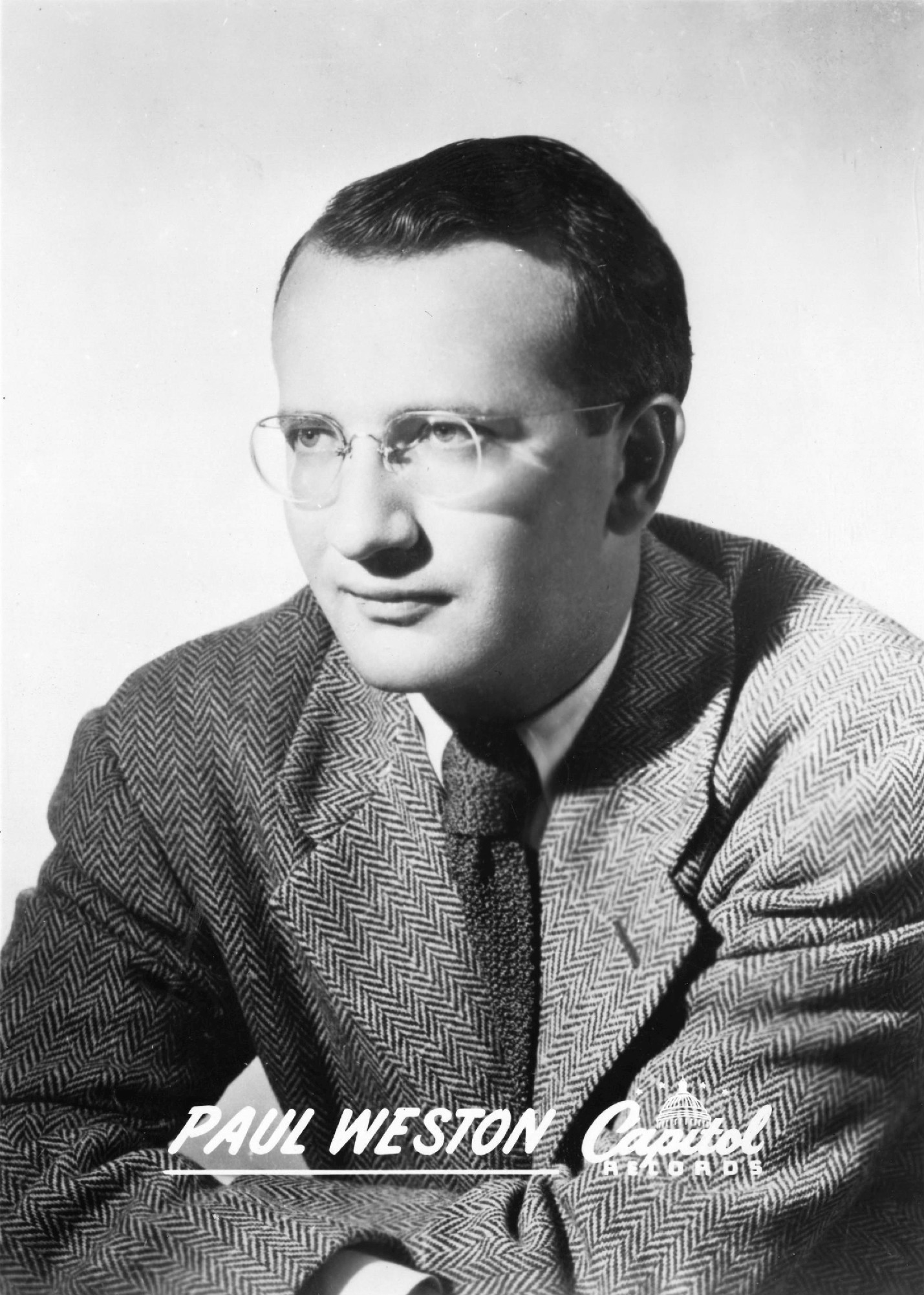
Paul Weston
Paul Weston (born Paul Wetstein; March 12, 1912 – September 20, 1996) was an American pianist, arranger, composer, and conductor who worked in music and television from the 1930s to the 1970s, pioneering mood music and becoming known as "the Father of Mood Music". His compositions include popular music songs such as "I Should Care", "Day by Day", and "Shrimp Boats". He also wrote classical pieces, including "Crescent City Suite" and religious music, authoring several hymns and masses. Born in Springfield, Massachusetts, Weston had a keen interest in music from an early age and learned to play the piano. He was educated at Springfield High School, then attended Dartmouth College and Columbia University. At Dartmouth he formed his own band and toured with the college band. He joined Columbia's dance band, The Blue Lions, but was temporarily unable to perform following a rail accident, and did some arrangements while he recovered. He sold his first arrangements to Joe Haymes in 1934. When Haymes requested more material, Weston's music was heard by Rudy Vallée, who offered him work on his radio show. Weston met Tommy Dorsey through Haymes and in 1936 became a member of Dorsey's orchestra. He persuaded Dorsey to hire The Pied Pipers after hearing them in 1938, and the group toured with the bandleader. After leaving Dorsey in 1940, Weston worked with Dinah Shore and moved to Hollywood when he was offered film work. In California he met Johnny Mercer, who invited him to write for his new label, Capitol Records. Weston became music director there, where he worked with singer Jo Stafford and developed the mood music genre. Stafford moved with him to Columbia Records in 1950, and they were married in 1952. Weston worked extensively in television from the 1950s to the 1970s. He helped start the Grammy Awards, which were first presented in 1959. He was honored with a Grammy Trustees Award in 1971 and spent three years as music director of Disney on Parade. Weston and Stafford developed a comedy routine where they assumed the guise of a bad lounge act named Jonathan and Darlene Edwards. Their first album was released in 1957. In 1960, their album Jonathan and Darlene Edwards in Paris won the Grammy Award for Best Comedy Album. Weston's work in music is honored with a star on the Hollywood Walk of Fame. |
Birth and Death Data: Born March 12, 1912 (Springfield), Died September 20, 1996 (Santa Monica)
Date Range of DAHR Recordings: 1936 - 1947
Roles Represented in DAHR: arranger, songwriter, composer
Notes: Listed as Paul Wetstein on some disc labels.
 = Recordings are available for online listening.
= Recordings are available for online listening.
 = Recordings were issued from this master. No recordings issued from other masters.
= Recordings were issued from this master. No recordings issued from other masters.
Recordings (Results 26-27 of 27 records)
| Company | Matrix No. | Size | First Recording Date | Title | Primary Performer | Description | Role | Audio |
|---|---|---|---|---|---|---|---|---|
| Victor | D7VB-2717 | 10-in. | 12/19/1947 | Congratulations | Moonlight Serenaders ; Garry Stevens ; Tex Beneke Orchestra | Male vocal solo, with vocal quartet and jazz/dance band | songwriter | |
| Victor | D7VB-2937 | 10-in. | 12/21/1947 | Evelyn | The Clark Sisters ; Harry Prime ; Tommy Dorsey Orchestra | Male vocal solo, with female vocal group and jazz/dance band | songwriter |
Citation
Discography of American Historical Recordings, s.v. "Weston, Paul," accessed April 28, 2024, https://adp.library.ucsb.edu/names/103378.
Weston, Paul. (2024). In Discography of American Historical Recordings. Retrieved April 28, 2024, from https://adp.library.ucsb.edu/names/103378.
"Weston, Paul." Discography of American Historical Recordings. UC Santa Barbara Library, 2024. Web. 28 April 2024.
DAHR Persistent Identifier
External Sources
Wikipedia: Paul Weston
Discogs: Paul Weston
Allmusic: Paul Weston
Apple Music: Paul Weston
IMDb: Paul Weston
Britannica: Paul Weston
Linked Open Data Sources
LCNAR: Weston, Paul, 1912-1996 - http://id.loc.gov/authorities/names/n81139249
Wikidata: Paul Weston - http://www.wikidata.org/entity/Q1765101
VIAF: http://viaf.org/viaf/90710378
MusicBrainz: Paul Weston - https://musicbrainz.org/artist/d56d5118-77f4-4f5d-8997-813e4670806a
Wikipedia content provided under the terms of the Creative Commons BY-SA license
Feedback
Send the Editors a message about this record.
